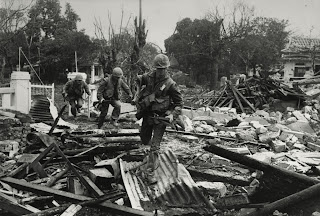Don McCullin is an internationally renowned photojournalist. McCullin is particularly known for his gritty images of War and Poverty and the African AIDS epidemic. It's McCullin's War photography that interests me the most.
One of McCullin's most famous photographs is this picture of an American soldier taken during the Vietnam war. The photograph, titled Shell-shocked US marine, Hue, Vietnam, February 1968, shows the effects of war on the human psyche and is just as powerful as some of the more violent Vietnam images. The portrait is very simple yet captures the fragility of the subject. The soldiers shell-shocked gaze seemingly stares right through you.
It's a harrowing, yet subtle reminder of the fact that war destroys lives in many different ways. Soldiers in Vietnam used to say the lucky ones died early on. Those who survived the conflict lost more than they could have imagined.
The use of black and white in this image just adds to the bleakness and draws your focus to the soldiers soulless gaze while the tight crop cuts out any distracting backgrounds.
 US soldier during the Tet offensive. Hue, Vietnam, 1968 shows McCullin had a great eye for composition. Whether this shot was staged or came about by chance you cant help but be drawn to the picture in the bottom corner. I'm presuming that the couple in the picture were once occupiers of the home which is now a vantage point in the middle of a war zone. My mind wonders whether the couple fled to safety or were victims of the Vietnam war.
US soldier during the Tet offensive. Hue, Vietnam, 1968 shows McCullin had a great eye for composition. Whether this shot was staged or came about by chance you cant help but be drawn to the picture in the bottom corner. I'm presuming that the couple in the picture were once occupiers of the home which is now a vantage point in the middle of a war zone. My mind wonders whether the couple fled to safety or were victims of the Vietnam war.The use of the light from the window and the brightness of the walls gives the image a very clean look. A lot of war photography is very dark and grainy but this picture is quite the opposite, and it adds to the mood.
I can almost see this as the calm before the storm.
'Fallen North Vietnamese Soldier' Vietnam 1968 shows one of the more harrowing images of the Vietnam war. The loss of life itself. Although the image of the fallen soldier is particularly harrowing, what this picture points out to me is that war effects more than just the opposing sides and the landowners.
On inspection you notice that the body in the image is not the main focal point. The personal belongings of this particular soldier are the focus of the image. They appear slightly sharper and lighter than the rest of the picture. I doubt that McCullin found the arrangement of the soldiers belongings exactly the way they appear in the picture. its clear to see that this Vietnamese soldier had a loved one waiting back home for their safe return Upon closer inspection you can also see that the soldier was a father as well.
This picture, along with many of McCullin's images, was printed in the Sunday Times Magazine. His photographs have inspired many people (myself included) and I would definitely like to incorporate some of his techniques and uses of black and white tones into my War project.
"I have been manipulated, and I have in turn manipulated others, by recording their response to suffering and misery. So there is guilt in every direction: guilt because I don't practice religion, guilt because I was able to walk away, while this man was dying of starvation or being murdered by another man with a gun. And I am tired of guilt, tired of saying to myself: "I didn't kill that man on that photograph, I didn't starve that child." That's why I want to photograph landscapes and flowers. I am sentencing myself to peace." - Don McCullin



No comments:
Post a Comment